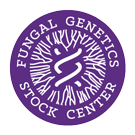Strain: Neurospora crassa
FGSC #1861
Reporting Genes: bd;inv
Species: crassa
Allele: no#;no#
Alternate Strain Number: MLS 1-6.timex
Depositor: MLS
Linkage Group: IVR;VR
Mating Type: a
Opposite Mating Type: 1860
ref1: Sargent & Woodward '69 J Bact 97:861-867 XS11, https://doi.org/10.1128/jb.97.2.861-866.1969; SX12 https://doi.org/10.1128/jb.97.2.867-872.1969
ref2: XS10 https://doi.org/10.1104/pp.41.8.1343; XS9 https://doi.org/10.1104/pp.42.11.1504
Genes
| Locus | Cultural Requirements | Link Group |
|---|---|---|
| bd | Because dense bands of conidia are produced on appropriate solid medium at intervals of about 24 hr (1792, 1794), the mutant has been used extensively to study circadian rhythms (239, 560, 621, 1382, 1794). bd has no effect on the underlying clock mechanism, but allows the visible expression of rhythm (622). Grow rate is about 70% that of the wild type (232). Conidiation is enhanced, even on slants (232). CO2 inhibits conidiation and, thus, inhibits banding; bd is much less sensitive than wild type to this effect of CO2 (1792). Biotin starvation leads to a phenocopy in wild type and to increased persistence of banding in bd (2206). Originally identified in a bd; inv strain called "timex" (1791). bd alone is sufficient to cause banding (1794). Used to study conidiation under nonstarvation conditions (1820). Used in a study of morphological differentiation patterns such as concentric rings and radial zonations (528). Expression is affected by changing the concentrations of agar, sugar, and salts. Conidial scatter is eliminated in the double mutant bd; csp (239). Conveniently scored by conidial banding on agar in long tubes or large plates at 25oC in constant dark or in a dark-light cycle, but not in constant light (1791). | IVR |
| inv | VR. Right of pab-2 (3%) and ro-4 (5 to 8%), Left of asn (4 to 9%) (918, PB).Unable to use sucrose as a carbon source. Grows well on glucose or fructose and fairly well on Casamino Acids or yeast extract. Invertase structural gene; invertase deficient and uninducible by normal inducers. Makes cross-reacting material (919). Invertase is also affected by cot-2, q.v. | VR |
